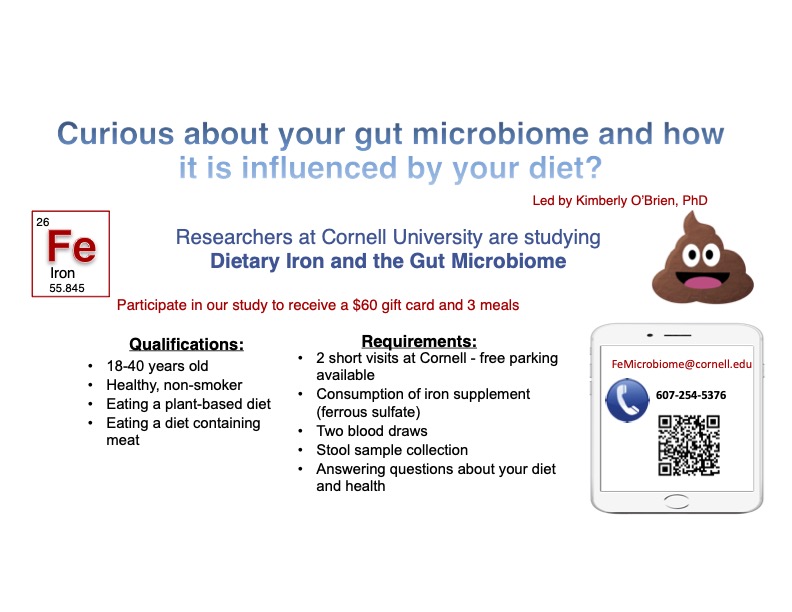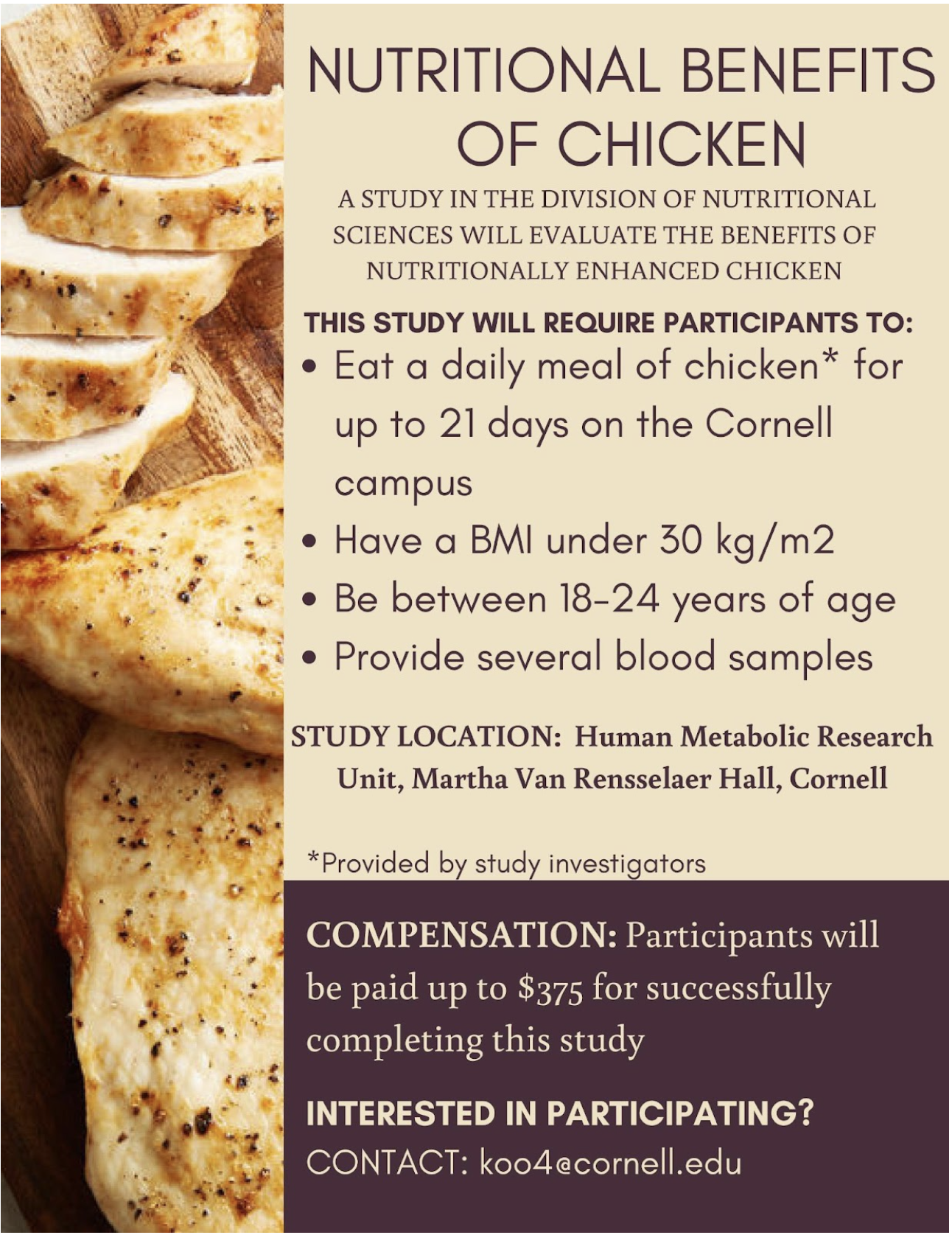O'Brien Lab Research

The O’Brien Lab has numerous research projects currently recruiting participants. Below are all the current studies running in the lab.
N.B. Although we do emphasize conducting pregnant and pediatric population-based research, the studies below are not limited to those populations unless otherwise noted.

The FeMicrobiome Study, led by the O’Brien lab, is seeking participants. This study seeks to understand how diet impacts the gut microbiome and iron absorption.
Eligibility: 18-40 years old, healthy, non-smoker, habitually ingesting a plant-based diet, habitually ingesting a diet containing animal products
Time Commitment: 2 short visits to the Human Metabolic Research Unit in Martha Van Rensselaer Hall
Study Location: Cornell University, Ithaca, NY
Honorarium: $60 gift card and 3 free meals
Email: FeMicrobiome@cornell.edu
Tel: (607) - 254 - 5376
%20(1).png)

The Nutritional Benefits of Chicken Study, led by the O’Brien Lab, is seeking participants. The study seeks to understand if chicken that is fed a diet that contains omega-3 fatty acids, vitamin D, or both nutrients provides additional health benefits by improving the status of omega-3 fatty acids and vitamin D in healthy adults who eat this bioenhanced chicken.
Eligibility: BMI under 30 kg/m2, 18-24 years old
Time Commitment: eat a daily meal of chicken for up to 21 days on the Cornell campus and provide blood samples
Study Location: Cornell University (Ithaca, NY)
Honorarium: $375 cash
Email: koo4@cornell.edu
O'Brien Lab Research Projects
O'Brien Lab Research Projects
Characterization of Iron Regulatory Hormone Erythroferrone During Pregnancy
Study Co-Principal Investigators: Kimberly O'Brien, PhD and Elizabeta Nemeth, PhD
Specific Aims:
Maternal iron deficiency increases the risk of adverse birth outcomes and inadequate neonatal iron endowment, which may lead to irreversible adverse effects on fetal brain development. During pregnancy, adaptations to iron homeostasis occur due to increased maternal, neonatal and placental iron demands, Maternal iron absorption and release from stores is regulated in response to iron demands via regulatory hormones erythropoietin, hepcidin and erythroferrone. While data on erythropoietin and hepcidin during pregnancy exist, no data on erythroferrone in human pregnancies exist due to previous lack of validated human assay. Therefore, the study aims to characterize erythroferrone during pregnancy and to assess its utility as an indicator of iron status.
Funded by: NIH-NICHD
Genetics of Iron Absorption (FeGenes)
Study Co-Principal Investigators:Kimberly O'Brien, PhD and Zhenglong Gu, PhD
Specific Aims:
The FeGenes study stands for iron(Fe) Genes in East Asians and Northern Europeans study. This study will take a multidisciplinary approach to study genetic variations in genes that control Fe metabolism and utilization in order to shed light on the genetic basis of population differences in Fe metabolism and disease susceptibility and to inform population-specific dietary Fe intake recommendations with the long-term goal of minimizing the risk of chronic diseases. More specifically, we will employ in vivo approach using stable iron isotope method to measure iron absorption directly and characterize the genetic makeup by genotyping array.
Study Population: 250 East Asians and 250 Northern Europeans
Funded by: NIH-NIDDK and The Office of Dietary Supplements (ODS)
USDA AFRI-NRI Study
Funded by: USDA AFRI-NRI
Study Co Principal Investigators: Xingen Lei and Walter Bottje
Specific Aims: This study involves a large transdisciplinary team from the University of Arkansas, Cornell University and eight other institutions to innovate and integrate research, teaching and extension to empower US broiler production for growth, profitability and sustainability. Vitamin D and omega-3 fatty acids are nutrients of concern in the US diet. Animal products are known to contain 25(OH)D and this form of vitamin D is thought to be significantly more bioavailable than vitamin D. Sources of omega-3 fatty acids are limited in the US diet. Our role in this project will be to help develop poultry that is bioenhanced to contain omega-3 fatty acids and 25-hydroxyvitamin D. Potential health benefits of these bioenhanced forms of chicken will be tested in human studies carried out in our Human Metabolic Research Unit.
Iron utilization during pregnancy studies
Other ongoing research is evaluating iron utilization during pregnancy and how it is partitioned to the mother and fetus.
Vitamin D: Status Impacts Inflammation and Risk of Infections During Pregnancy
Principal Investigator: Kimberly O'Brien
Funded by: USDA-NRI
Determinants of Neonatal Iron Homeostasis in Women Carrying Multiples
Study PI: Kimberly O'Brien; Co-Principal Investigators: Eva Pressman, MD; Ronnie Guillet MD, PhD; Philip Katzman, MD; and Elizabeth Cooper, CNM, RD
Specific Aims:
1. To learn more about iron status in women having twins and triplets and to see how maternal iron status influences the amount of iron that is present in babies at birth
2. Maternal weight gain, hematological measures, Fe status indicators and serum hepcidin were longitudinally assessed across pregnancy in women carrying multiples during routine blood testing for alpha-feroprotein.
3. Cord blood were obtained from each neonate at delivery.
4. Inflammatory markers (CRP IL-6) were measured in all maternal and cord blood samples and related to outcomes.
Study Population: 140 pregnant adolescents (age 11-18 y) and their newborn infants
Funded by: Gerber Foundation
Research Opportunities
Research Opportunities
Human Ecology Summer Research Stipends for Undergraduates: The College of Human Ecology provides a limited number of stipends to CHE undergraduates who will be involved in full-time summer research with a CHE faculty member. Both the student and the faculty member must be in CHE. Students and their faculty mentors must both submit applications. Students should work with faculty members in preparing the 2-3 page proposal that is required as part of the application. All currently enrolled CHE students may apply provided that they have a CHE faculty research advisor, are in good academic standing, and will be continuing as CHE undergraduate students in the fall semester. Students must be available for a full-time, 8-week summer research position. Simultaneous enrollment in courses is not permitted. Students must submit short reports at the end of the research experience. Visit CHE's Undergraduate Research site to learn more.
Research Credit
This option is only offered to a limited number of students each semester and is typically only offered to students who have already worked in the lab. For further information, contact Dr. Kimberly O'Brien, at koo4@cornell.edu.
Laboratory Journal Club
The laboratory meets once a week to listen to a presentation about a recent research article pertaining to preliminary data on the active projects. This is a one credit option (not offered for credit every semester) in which students who are enrolled in research credit are expected to present one journal article during the semester.
Mandatory Laboratory Training
Members of the O'Brien lab must complete the following courses:
Cornell EH&S training #1074 Bloodborne Pathogens Training
Initial training for all individuals who work with or have reasonable anticipated skin, eye, mucous membrane, or parenteral contact with human blood or blood components and body fluids; unfixed human tissue or organs including cell or tissue cultures; and blood, organs or other tissues from experimental animals infected with HIV or hepatitis virus. Refresher training is required every 12 months. Initial Training is required in person.
Cornell EH&S training #2555 Laboratory Safety
Required training for faculty, staff, graduate and undergraduate students who work in a laboratory environment. Training can be completed on-line via CU Learn.
CITI training
Full, Foundational Course on Responsible Conduct Research (RCR) for Biomedical Sciences (Stage 1- RCR), completed online.
Work Study/Paid Positions
Students (from any college at Cornell) who have been granted work study as part of their financial aid package can get paid for their research work in the lab.
Senior Honors Thesis
For information about doing a senior honors thesis in CHE, contact DNS Student Services.
Hunter R. Rawlings III Cornell Presidential Research Scholars
The majority of students are chosen for the Rawlings CPRS program as incoming freshmen. Current Cornell sophomores, who were not chosen as entering freshmen to be in the Rawlings CPRS program, may apply in the spring of their sophomore year to be admitted into the program at the beginning of their junior year. For students interested in this option, please visit RCPRS Prospective Scholars

Kimberly O'Brien, PhD
230 Savage Hall
Cornell University
Ithaca, NY 14853
607) 255-3743
koo4@cornell.edu
Follow us on social media